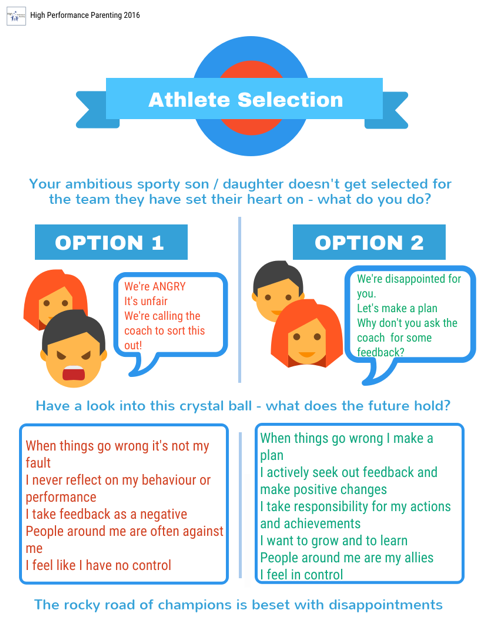
Coping With Disappointment
At High Performance Parenting, we work primarily within the context of sport, but coping with disappointment is a skill that your children will thank you for in any walk of life.
Let's face it, nobody sails through every day without hitting the odd brick wall now and again, and having the resilience and robustness to cope, and not only cope but grow from the experience is a real asset.
We work with a lot of parents who are trying to support their children through the turmoil of an unfavourable team selection decision. If your child has set their heart on a goal, and put in time, effort and energy to achieve it, and then failed, it may feel unfair and your reaction will be hugely emotive. And please, don't beat yourselves up about this. You are human after all, and you are carefully programmed to protect your offspring from harm, so rage is a perfectly acceptable initial reaction. However, if that standpoint remains, and that angry message of 'unfair' is firmly delivered to your child, then let's unpick what that might mean for the future.
As you can see from our infographic below, if a child feels that an 'unfair' decision has been perpetrated against them, your reaction may leave them feeling that you've got their back (which of course you have) but it will also leave them powerless to do anything about the decision. But it won't be long until they are all grown up and flown from your nest, then how will they cope with decisions like these on their own?

An alternative approach is to empathise with their disappointment, but help them to understand that today, they are not quite good enough for that team. You've still got their back, but now you can make a plan to improve and make the team next time. I always advise use of the word 'yet', it encourages children to see that the skills and attributes that they needed to be in that team are achievable with more work, just not yet. Then encourage your child to seek out some feedback from the coach. That way they can focus their attention away from the initial disappointment and move into a phase of action to re-assess their goal and make a new plan on how they are going to achieve that.
Sometimes when I suggest this to parents they respond that the coach or teacher is not open to giving feedback, or there isn't a culture of feedback at the club or school. This may well be the case, or it may be that the coach is working on a voluntary basis, is responsible for lots of young sportspeople, is very pushed for time or actually also finds the process of picking a team quite stressful. Choosing a team, whether it is for the Olympics or the school swimming gala is a tricky business for coaches and teachers. Ultimately they are trying to pick the best team, but there are myriad factors that come into selection decisions that they have to balance, which is a difficult and time consuming process.
Helping your child to find the right vocabulary to ask for feedback in a respectful and succinct way will stand them in good stead in all walks of life, well into adulthood. Encourage your child to find a quick moment with the coach to say in their own way:
- I am really disappointed that I am not in the team
- I completely respect your decision
- I would be really grateful for three pointers on how to improve my performance so I can up my game
- Thanks for your time
In the long run, your child is unlikely to be measured on the team they did or didn't make at school, but their ability to reflect on and deal with disappointment shows great strength of character and will enrich their adult life.
*********
High Performance Parenting offers a support service to parents in the form of workshops, seminars and 1-2-1 clinics at schools, sports clubs, national governing bodies and corporate networks. We work with two key groups
- Parents whose children are already involved in sport and who want simple, clear advice on supporting their children to reach their potential, learn life lessons and enjoy the journey.
- Parents who want their children to be more active and to develop a positive engagement with sport, enjoying all the benefits that can bring.
The ethos of the organisation is to help children to achieve their potential in sport and activity, and to be the best they can be. And for their parents to feel comfortable and confident throughout the parenting journey.
Twitter: @hpparenting
Facebook: High Performance Parenting
Linked In: Eira Parry
Instagram: hpparenting





 Originally Released On 16 April 2018
Originally Released On 16 April 2018